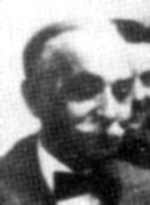Abraham Gepner was born in Warsaw in
1872;
before WW 2 he was a businessman, a member of the Warsaw City Council and a leading
figure in Jewish affairs and charitable activities. He was also Chairman of the Union of Jewish Merchants.
When the Germans invaded Poland in
September 1939,
Gepner was 67 years old. On the occupation of Warsaw, Gepner and
Samuel Zygelbojm were the two Jews among 12 leading personalities taken hostage.
Abraham Gepner served on the Warsaw Ghetto Judenrat from its inception and was close to
the Judenrat Chairman,
Adam Czerniakow.
In
November 1940, Gepner became head of the
Supply Department, which provided food and other essential items. Although Gepner was unable to
prevent hunger and widespread death through starvation, the ghetto’s inhabitants trusted him and his
department worked as efficiently as possible. Gepner was also involved in assistance and welfare in
the ghetto, especially for children and orphans.
According to
Czerniakow’s diary entry for
17 February 1942, Gepner was talking with some staffers:
“
Do you know how to count?”
“Yes we do.”
“Then don’t count on me.”
On
21July 1942, members of the
Sicherheitspolizei arrested those
present in
Czerniakow’s office at the
Judenrat, as well as Senior
Councillors. At the same time the senior officials of the Provisioning Authority, with Gepner heading
the list, were also seized.
Czerniakow requested the release
of Gepner from
Heinz Auerswald and
Hermann Höfle.
On
22 July, Gepner was released and was back in the
ghetto by 3:45 p.m. He rejected an offer from Polish friends to shelter him on the “Aryan” side of
Warsaw, choosing instead to remain in the ghetto.
A letter he wrote on
1 January 1943, contains the following
passage:
"
I have no regrets about staying in the ghetto, nor about any
of the decisions that I made. Recently I reached the age of seventy, and remaining in the
ghetto, together with my brothers and sisters, I regard as the most important step I took
in my life. If I have succeeded in drying a single tear - that is my reward. I have a daughter
living in the United States. Tell her that I served my people faithfully."
Gepner's daughter,
Angela, died in
New York on
20 February 2003,
aged 100.
Gepner supported the ghetto underground and secret pioneer movements. When the
Warsaw Ghetto Uprising began on
19 April 1943, he initially refused to hide in a bunker; however, he eventually relented
and sought refuge in a bunker on
Franciszkanska Street.
On
3 May 1943 the Germans captured the bunker and pulled
Gepner and others from their hideout and shot them.
SOURCES:
Trunk, Isaiah.
Judenrat. The Jewish Councils in Eastern Europe Under Nazi Occupation, The Macmillan
Company, New York, 1972
Gutman, Israel, ed.
Encyclopedia of the Holocaust, Macmillan Publishing Company, New York, 1990
Yad Vashem.org. "Abraham Gepner".
http://query.nytimes.com
© ARC (http://www.deathcamps.org) 2006







